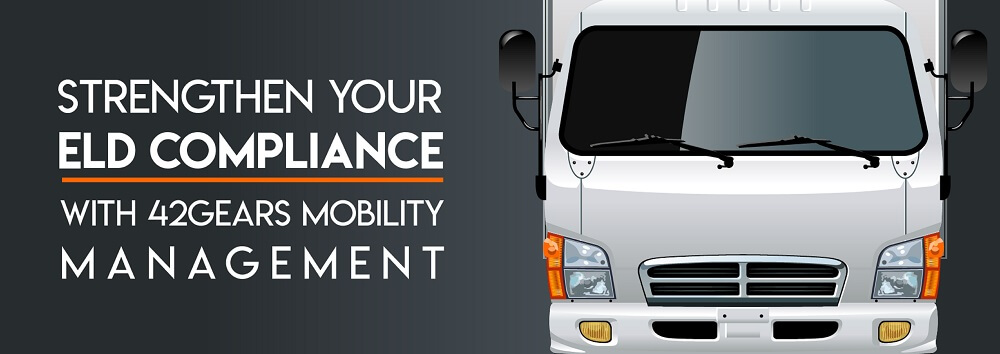Strengthen your ELD Compliance with 42Gears Mobility Management
Nov 23, 2017 | 42Gears Team
About ELD
In December 2015, the Federal Motor Carrier Safety Administration (FMCSA) published the new Electronic Logging Device (ELD) mandate. It was first outlined along with the “Moving Ahead for Progress in the 21st Century” bill in 2012, enacted by the United States Congress. The ELD Mandate required the FMCSA to formulate a rule that dictates the use of Electronic Logging Devices (ELDs) by drivers.
ELD will electronically capture Record of Duty Status (RODS) for drivers. It effectively replaces the need for paper logs that are currently used to record drivers compliance with Hours of Service (HOS) mandate.
As per the ELD Mandate, all fleets have to implement certified ELDs to document HOS by December 2017. Fleets that are already using electronic logging techniques have to ensure compliance with the necessary specifications by December 2019.
Presently, many fleet management companies are already using automatic on-board recording devices (AOBRDs) to track daily drives and reduce paperwork. These devices are designed as per FMCSA’s standard rule to automatically record the status of a driver’s duty and the number of hours they operate the vehicle. FMCSA has stated that fleets with AOBRDs can continue to use the devices until late 2019.
The ELD standard will:
- Electronically track a driver’s hours of service.
- Have to be synchronized with a truck’s engine to ensure accurate capture of drive segments.
- Pass on the captured data to a system where it can be accessed by a safety or fleet manager in real-time.
By operating truck and fleet applications on ELDs fixed in commercial motor vehicles, it has become easier to monitor and record a whole range of data on drivers and their vehicles. Companies are now able to acquire more information on Driver Vehicle Inspection Reports (DVIR) and driver behaviour reports detailing speeding, idling, and hard braking.
Benefits of ELDs
Some of the benefits of ELDs are:
- Reduces paperwork and saves driver time.
- Keeps driver focused on driving.
- Keeps dispatcher or manager up-to-date on drivers’ status, helping in better planning of load dispatch as per HOS compliance.
- Increases driver communication.
While passing the ELD Mandate, the FMCSA recognized the burden and additional costs on fleets. In order to address the concern of saving drivers and fleets from unaffordable electronic logging technology, the FMCSA ruled that smartphones, tablets, and even rugged handhelds can be used in accordance with ELD requirements.
This makes it easy for fleets to opt for cost effective hardware like smartphones or tablets to implement ELD rule. With widespread use of smartphones across the globe, truck drivers will be more familiar with their UI, allowing easier acceptance and adoption.
42Gears and ELDs
As you work towards being ELD compliant, choose 42Gears EMM solution to secure, monitor and manage your mobile devices. Comprehensive feature set includes device lockdown, driver safety mode, location tracking, remote app installation and upgrade, remote screen control for troubleshooting, two way messaging and more.
View Challenges with ELD Deployment infographic here.
Subscribe for our free newsletter

